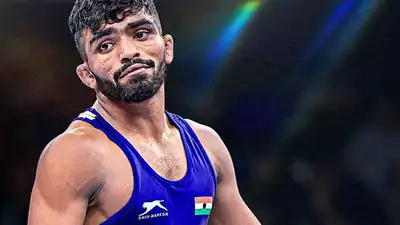ARTICLE AD BOX

Sumit Malik (Image credit: X)
NEW DELHI: When 18-year-old Sumit Malik stepped onto the wrestling mat in Samokov, Bulgaria, he carried far more weight than just the 57 kilograms of his category. He carried the burden of a life that began, as it is mostly with the sport, with financial constraints, the hopes of a village that watched him grow, and the unshakeable belief of a coach who refused to let hardship define his future.On Tuesday evening, at the U-20 World Wrestling Championships, Sumit won the silver medal for India, losing 5-8 in the final to Russia’s Magomed Saliakh Ozdamirov (competing under the United World Wrestling banner). In that fight, and in the story of how he got there, Sumit showed the essence of sport — courage, grit and the refusal to surrender.
Go Beyond The Boundary with our YouTube channel. SUBSCRIBE NOW!
Born in Kasanda village in Sonipat district of Haryana, Sumit’s earliest years were marked by deprivation.
His father Surender Malik, a bus driver, would return home late in the night with stiffened hands and an exhausted frame, yet never with complaints. Meals were frugal, opportunities scarce. Wrestling mats, shoes, diet supplements were luxuries the young boy could not dream of. But somewhere, in the dusty akharas of Haryana, he decided that his fate would not be a prisoner to his financial constraints.It was in Bulgaria, during an early-round clash, that Sumit’s resilience was most vividly on display.
Facing Japan’s Rin Sakamoto, a senior world championship participant, Sumit trailed 1-10. In wrestling, that margin usually spells the end. One more point, and the match would be over. Technical superiority would have declared Sakamoto the winner.The referee was on the verge of stopping the contest when Sumit suddenly found a new wind. With every gasp of breath, Sumit clawed his way back. A takedown here, a counterattack there.
The impossible began to look possible. The deficit shrank.“I just told myself — this is not how my story ends,” Sumit told TOI over the phone from Bulgaria. “I thought of my father, my coach, my village. I thought of the days when I trained hungry. I could not give up.”By the final whistle, the impossible had been achieved — he had turned a 1-10 deficit into victory.“Wrestling requires strength, but it’s the mind that wins battles,” Sumit’s coach Ashwani Dahiya, who runs the renowned Ashwani Akhada Khel Samiti in Kharkhoda, Haryana, said.
“That bout was the turning point. It showed the world who Sumit is. He is a fighter, on and off the mat.”The Japanese scalp lifted Sumit’s campaign. He stormed through the quarterfinals with authority and then dispatched Moldova’s Ion Bulgaru 11-3 in the semifinal. “I knew after the bout against the Japanese wrestler, who has defeated big names in the senior category, that I had to maintain my intensity till the time the gold medal was around my neck.
I wanted to wrestle every point like it was my last,” Sumit said.The final brought him face to face with Russia’s Ozdamirov, a wrestler known for his technical precision. It was a tight contest, with both grapplers trading points. In the end, Ozdamirov edged Sumit. “Of course, I wanted gold,” Sumit said. “I am 18, I have another opportunity next year to win the U-20 world championship gold. I am also targetting gold at next year’s Asian Games.”Coach Dahiya isn’t satisfied either. “Kamiyaa sudhaarenge! (Will iron out his flaws when he comes back!),” was Dahiya’s prompt reply. “We will work on his leg defence, and some other issues. To be successful at the senior level, he has to raise his standard. The good thing is Sumit is very hard working.”Every top wrestler has a guiding light, for Sumit it was coach Dahiya who spotted more than just raw talent in the boy.
“When Sumit came to me, he was raw, undernourished, and desperate,” Dahiya recalled. “But he had a fire I rarely see. He would wrestle till he collapsed. That kind of hunger you cannot teach.”At 18, Sumit’s best years lie ahead. Dahiya believes this is the beginning. “India has a new name in wrestling,” the coach said.For Sumit, the next target is clear. “This medal has given me confidence,” he said. “I want to fight for India at the senior level and at the Olympics some day. If I could come back from 1-10, I can come back from anything.”



.png)
.png)
.png)
















 6 days ago
6
6 days ago
6








 English (US) ·
English (US) ·